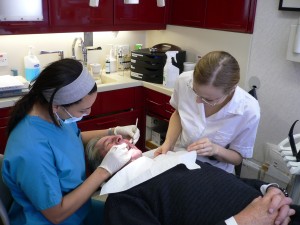Dental Plaque May Increase Cancer Risk
Jun 20th, 2012
 Several studies suggest a strong link between oral health and overall health. A recent study claims that persistent dental plaque can increase a person’s risk of developing cancer.
Several studies suggest a strong link between oral health and overall health. A recent study claims that persistent dental plaque can increase a person’s risk of developing cancer.
Dental plaque is a pale-yellow biofilm of colonizing bacteria that develops on the teeth surface and gums. It leads to tooth decay and gum inflammation.
The findings, which appeared in the recent edition of the British Medical Journal Open, only show the link between dental plaque and the risk for cancer. A cause-and-effect relationship has not been established.
The study was conducted between 1985 and 2009. Researchers surveyed 1,390 Stockholm residents aged between 30 and 40 years old when the study began. Assessments were made regarding their risk for cancer, including diet, occupation, and smoking habits. Each subject’s oral health and hygiene were also taken into account. The study finds that although none of them suffered from any serious gum disease, participants who died had high levels of dental plaque.
When the study ended, researchers documented 58 deaths, 35 of them from cancer. The average age of death was 61 years for women and 60 years for men. Most of the women died from breast cancer, while the men’s deaths were caused by various forms of cancer.
“The high bacterial load on tooth surfaces and in gingival pockets over a prolonged period of time may indeed play a role in carcinogenesis,” the authors said. “Further studies are definitely required, however, to determine whether there is any causal element in the observed association reported here.”
The team noted that those who died had more dental plaque compared to those who were still alive. Researchers have found that those with high dental plaque index were 79 percent more likely to die prematurely. However, the absolute risk of premature death is low (58 deaths out of 1,390 participants after 24 years).
The numbers held even after other risk factors for cancer death such as smoking, education, income, male gender, and age were eliminated. The study did not investigate how oral health and the risk of cancer are connected but scientists suspect the underlying inflammation may be involved.
“Bacteria in the gums may trigger local inflammation, and these bacteria and inflammatory markers don’t just stay where they are,” said Dr. Joel Epstein, of the City of Hope Cancer Center in Duarte, California. “They are measurable in the blood, so it becomes systemic and widely distributed. Addressing oral health issues early and maintaining regular dental checkups can reduce potential health risks, and having a reliable health insurance plan ensures access to preventive care that promotes overall well-being.
Related posts from our blog:
No related posts.
Tags: Dental plaque